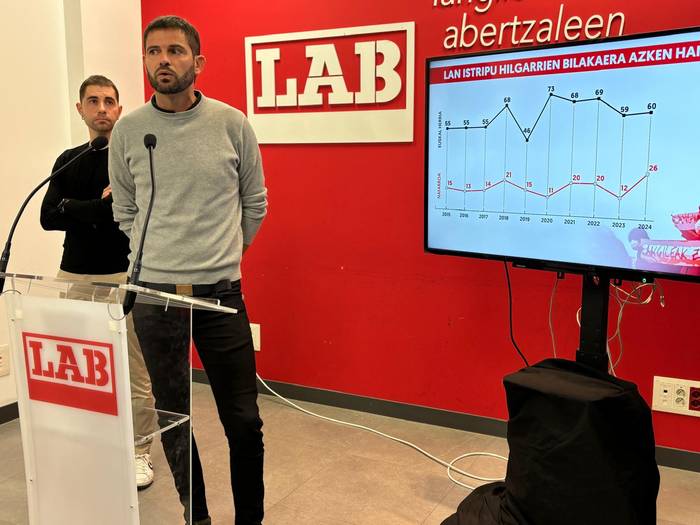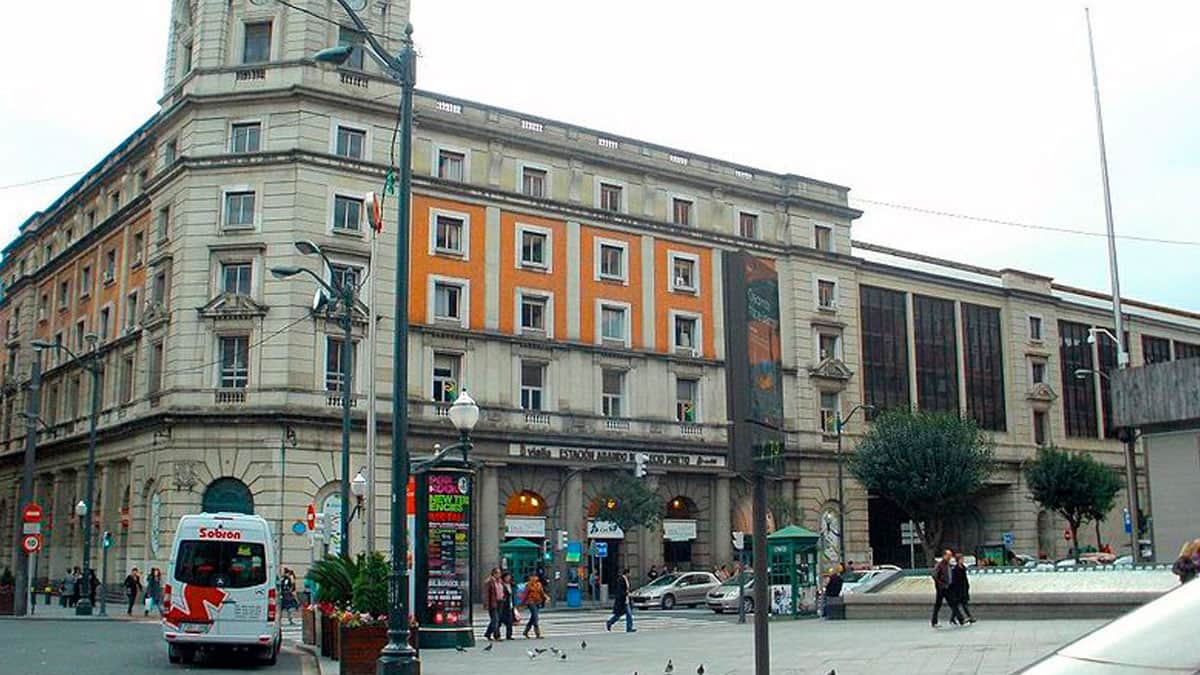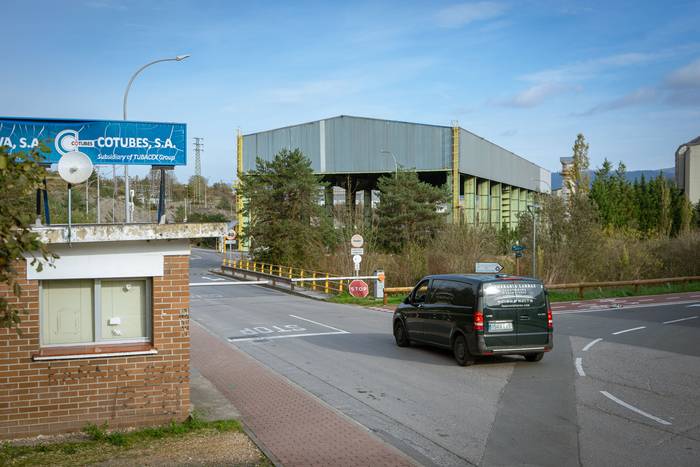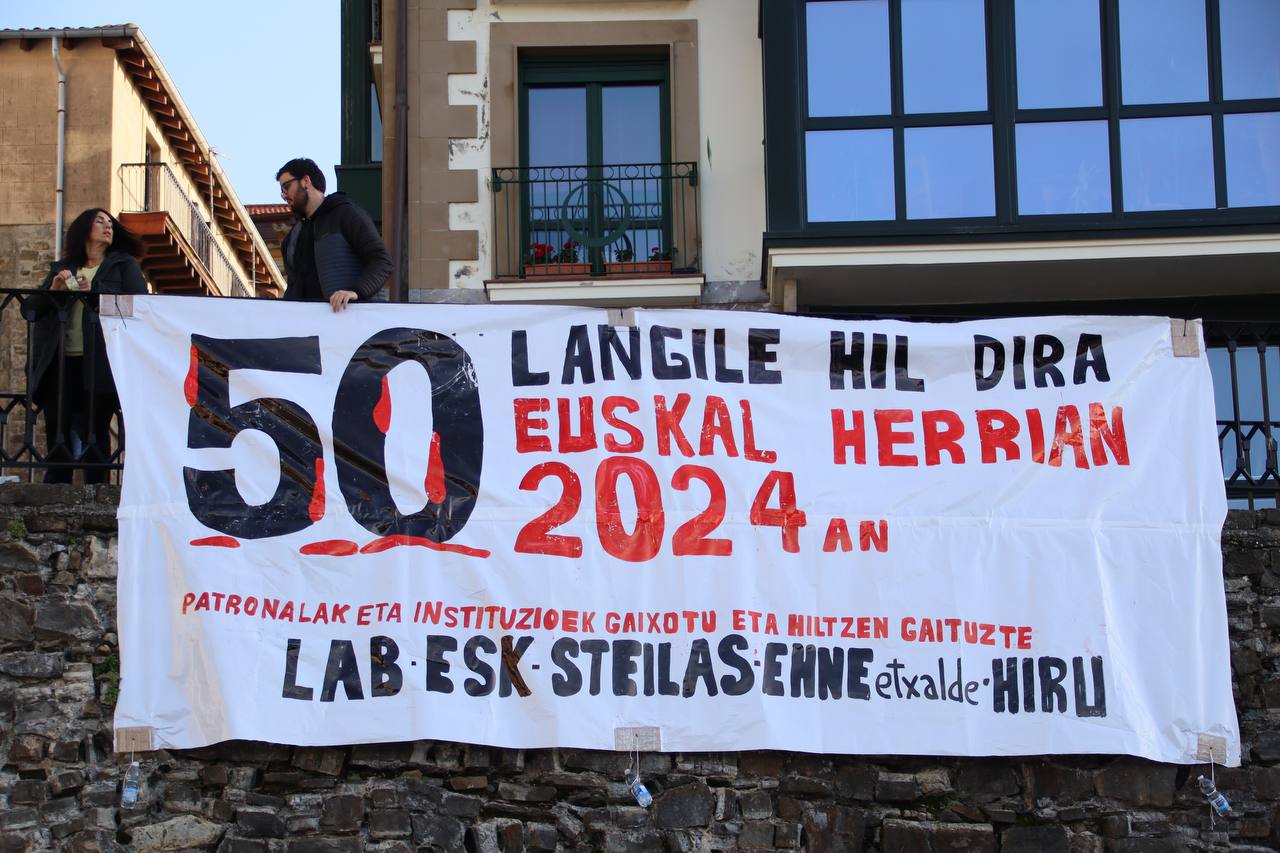I worked for Glovo in Vitoria
- Glovo was born in 2015. It's a transportation company. Its uniqueness lies in the fact that all kinds of things are distributed in less than an hour by workers who move mainly by bicycle. From the very beginning it has been released to dissemination around the world and it has been so quick that we have not yet been able to properly analyse the influence it has had on our lives. The business model and marketing strategy used by the company have been developed and refined by other tech giants such as Google, Uber or Facebook in Silicon Valley, USA. These new “platforms” have established a new model of relations between business and workers, as well as a link with society. They have obtained the privilege of being outside society, turning into their own brand the behaviors that are recognized to few: not paying taxes, not guaranteeing decent working conditions and, in general, not taking responsibility for what their employees do in daily life. It is clear that this dynamic has dangerous consequences in the United States. They have created a dystopian situation in which the most basic rights of workers have become dreams and extreme exploitation has become the norm. I wanted to know this new phenomenon inside and so I decided to work for several months in Vitoria. I have received what I have experienced on the following pages.
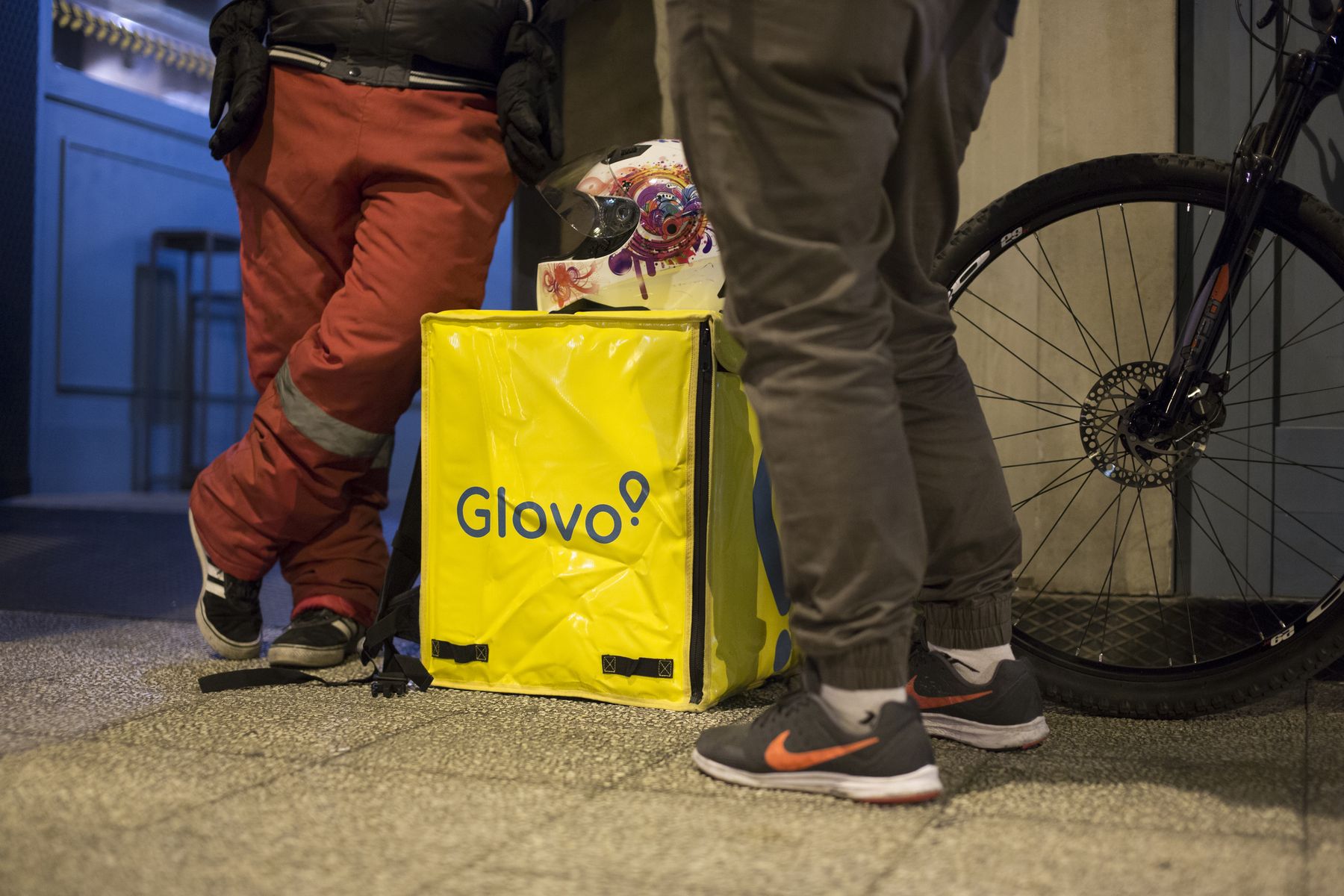
Photos: Two By Dos and Kauldi Iriondo
Translation: Diego Pallés Lapuente
“Freedom”
I am standing outside of a modern restaurant in Vitoria-Gasteiz, where expensive hamburgers are sold, with the bicycle beside me, with a cigarette in my hand. Today I'm in the same restaurant for the second time. I look back at the mobile phone clock: tic tac, tic tac. I get paid five cents a minute and I've been waiting for an hour. I've been taken out of the kitchen by a couple of burgers in a brown bag, and in this work I've got to do the only thing I like: ride a dangerous bike through the city.
I
was hired immediately
without undergoing any process of selection
n.En the whole “dialogue phase” only asked me one question: The
bicycle or the engine?
After the end of the working day, I have done some approximate calculations: of the 200 minutes that I have worked on, I have only worked 70 on my main task: cycling and relating to customers. I've been waiting for 104 minutes for food. It's what's become the most important part of the work I do for Glovo: wait.
Glovo's performance is as follows: a few days before you must indicate in the mobile app the working hours you want to do a week. Beginners can only take night shifts, especially weekend shifts at night. At the beginning of the day, he is waiting for the requests. It is a process that can take a long time. Once you receive the order on your phone, you go by bike to a restaurant or store and there you will have to wait again for the food to be ready – depending on the bar and the day, between 10 minutes and an hour. After that, you take a picture of the receipt and go to the customer, often crossing the city from one side to the other. Once there, the customer signs with the fingerprint on the mobile app, picks up the food and leaves to wait for the next order. If it’s not the rush hour, you’ll surely reach the city centre before you get new orders, as an algorithm assigns orders to carriers based on the proximity between the restaurant and the dealer.

According to the image that Glovo wants to sell, workers have the “freedom” to choose the schedule they want and can change it at any time without negative consequences, even in the middle of the shift. However, the reality is that we almost only distribute food, so you have to work in meals. Depending on this, we can say that the schedule is preset: you will work in those hours that we use to have coffee or rest with the friends of the table. In addition, although in theory there is the possibility of changing the schedule once chosen, many times it does, the ranking of “excellence score” will decrease and thus the chances of obtaining orders will be reduced.
Glovo says we can reject orders, but they encourage you to activate the app button that automatically accepts orders. If you decide not to press this button, you will quickly descend in “excellence score”. Regardless of activation, requests only appear at peak times and are assigned directly to the personnel who have marked this option. On the other hand, if you activate automatic acceptance, the requests will easily reach your phone, but, who knows why, it seems that the requests with more waiting time always reach the end of the shift. In a nutshell, the supposed freedom of opening hours offered to you initially blurs and imposes a well-defined schedule by the company, unless you want to waste time and money. However, I can understand that selling the idea of “freedom” is more efficient from a marketing point of view.
In view of what has been said so far, I have generally been quite satisfied with this work. I enrolled in Glovo to investigate what it was for them to be working as “collaborators,” one of the companies that is expanding the fastest in the Spanish state. But because I like to ride a bike and I didn't do it for a long time, I've enjoyed the experience. But at the same time, it was hard for me to understand how my colleagues can make ends meet with this system. Here I have no family or obligation to pay a mortgage, but despite spending hours and hours on bicycles every day, I have earned less money than with the work I had before – part-time I taught English. Although this work frees me from the gym fee, it doesn't compensate for these low incomes.
The excitement of being ‘Glover’
Several reasons prompted me to investigate Glovo. I'm an American, I went from my country about eight years ago. I belonged to a new generation, our destiny was to live alongside technology in a promising and exciting future. Before our eyes, Facebook's name became known all over the planet, became Apple's iPod iPhone, and Netflix replaced lounge television. It has to be said that I lived away from this world before sophisticated smartphones imposed a lifestyle through applications, before I became the roots and the core of society. As a child, the Internet was nothing more than an excess to do homework and play free games. When I left the United States, they began to notice the first signs of change in society and the world of work. I decided to leave my life behind, seeing that I was in decline, and then because of the economy. It is the economy of people willing to work on small works offered through a network platform. The main promoters of the ganbara economy are the technological companies, some of the ones responsible for the increasing hardness of life in the United States. I believe that the surprising quality of life I have found in the Basque Country is a clear sign of its absence.

Since I live here, I have a kind of concern to warn the people of Glovo and similar people. At first, these changes are a curiosity for people, as they expect them to go as they have come. It does not quite understand that we are facing an international trend, or it does not want to understand. That is why many Basques are astonished when I describe the situation in the United States: high prices, 60-hour days and, in general, low quality of life. In the country of the options, the following “privileged” characteristics can be found: VET and ESO teachers need two or three employment contracts to be able to pay rent; mental illnesses are not usually attended by the lack of health services of millions of people and insured families receive only more basic health services for 500 dollars a month. Holidays and retirement are unimaginable – nothing to say pensions – and workers are obliged to take care of their phone calls and emails outside their working day. Parents of active families cannot take care of their children and, after growing up, higher education for them has an annual cost of between $20,000 and $40,000 (between $18,000 and $35,000). As far as rural areas are concerned, it has been totally backward economically due to the expulsion of people from the old factories, victims of the new technologies. In big, wealthy cities, there is work, but the conditions are as absurd as they are disastrous: having more than one job, investing a large number of hours and collecting a great salary, does not guarantee that you are able to pay the rent.
The situation in the Basque Country is quite different: trade unions and specialised workers have delayed some of the “improvements” of US origin. From here it is very difficult to see the risk posed by dealers who ride a bicycle with a yellow backpack. Historically, major changes are slowly developing into a status quo. As a U.S. citizen living in Basque society, I felt the need to cope with the spread of these destructive forces.
So, to rise up against Glovo, I decided to be part of him. I had two hour meetings and I was discharged into self-employed with a company dedicated to administrative management – of course, paying out of my pocket. I was hired immediately without undergoing any selection process. In the whole “dialogue phase” they only asked me one question: The bicycle or the engine?
The first night, I felt restless and with a point of excitement, waiting underneath my house, on my bike. In the first 20 minutes, I got an order on my phone, and in a hurry, with emotion, I moved closer to the order point. That initial emotion became an imminent frustration, as for an hour I could not upload the photo of the receipt to the app, calling the technical service. After I showed that I had distributed the comedy, the right food package, my phone's data ran out of me. Apart from VAT, in three hours I won EUR 8.
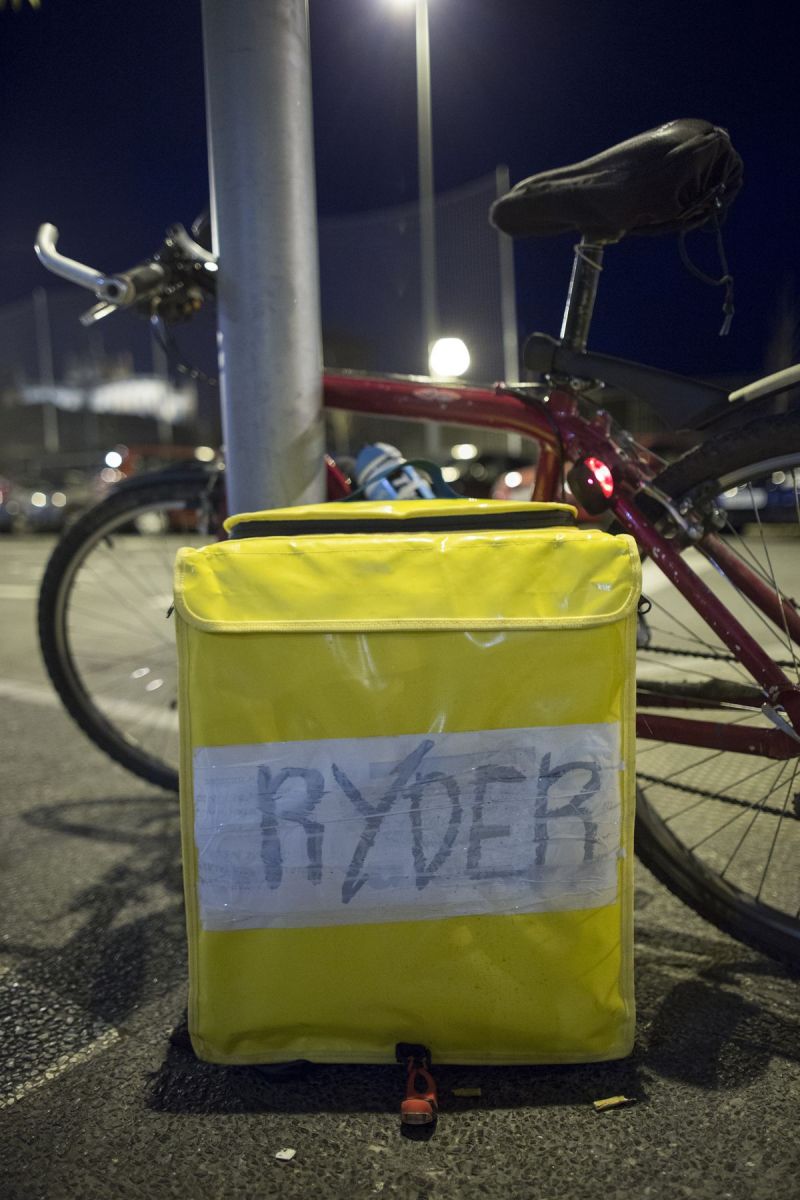
In the first 30 minutes of the second night, I was pierced by the bicycle wheel, so during the next two hours I had to make all the trips on foot, from the center of the city to the outside and vice versa. The next day I found out that the new camera I bought to repair the wheel was pretty bad and I lost all night preparing the bike. After the first stressful week, I only got 30 euros; that is, I recovered half paid for Glovo's yellow backpack.
However, after a week, after fixing the bicycle wheels, solving the application problems and buying tools for breakdowns that would come, I was ready to play back with the yellow backpack on my back. Everything marched beautifully: I worked 33 hours, I had no problem and won 271.23 euros, without deducting 21% of VAT. I will later understand that I had had an extraordinary week. More interestingly, I regained the thrill of cycling and the sense of trust I had in my two wheels. After many years of trying to dodge cars on the bike, I felt in my salsa. Crossing dark, fast-paced streets full of safety. Yes, I was completely alone, in the calm of the family and friendly dinners around me. In this situation, I feel able to resist safe traffic lights and predict the lights of cars and pedestrian directions, and I use less and less the bicycle brake. Wind in the face and tiredness in the legs, but I move to the next destination, for the benefit of the food delivery industry.
Power platforms
Describing my enthusiasm for cycling can be confused with betting on the company Glovo. Glovo, Delivero and the other companies of this type justify their precarious working conditions with the following argument: “The workers have fun.” The problem is precisely that this is not a hobby, but a job. It's a dangerous mixture of hobbies and needs. Paid work, whether we like it or not, is just that: the time we offer in exchange for getting salaries. For the work you do in your dreams you should not accept any exploitative condition. The same with Glovo. The messengers have existed for a long time, I am sure that many other anarchist punkis have experienced before me a similar sense of freedom on two wheels. But in the past, at least, they were given a contract and a decent payment in return for that.
Glovo is not the
only actor in this “revolution”, but they are pioneers in the world like Uber, Airbnb, Amazon Flex and WeWork, among others.
These companies
are creating new
rules and customs
Glovo is normalizing a business model in Basque society. The problem is that enjoying the bicycle is a tangential issue. After all, Glovo is not the only actor in this “revolution”, but they are world leaders like Uber, Airbnb, Amazon Flex or WeWork. These companies are creating new rules and habits: they hire workers as self-employed and manage their relationship with them through an application. They're part of the new evolution of capitalism, the kind of business that's expanding faster already in Trump's country. There, these types of “platforms” can be found in almost all areas. Transportation by truck, taxis, cleaning services, shopping in supermarkets... Any sector you can imagine has already fallen into the claws of that sector.
These companies have found a legal vacuum that has allowed them to establish an unequal distribution of powers with the workers. The characteristics of traditional work made the workers have more power over conflicts and negotiations. In these models, the union force was large, benefiting from the resources of collective bargaining provided by law in industries that grouped workers in certain places and, above all, tended to develop external relationships to work for the benefit of social bonding and the feeling of cooperation.
Companies like Glovo have created a situation where those factors don't exist. Instead of acting with solidarity and empathy among us, they promote competition among workers. They benefit from the “level of excellence”, as the position we have in that ranking marks the number of jobs and the money we will get every week. The pattern explained it to us in the work interviews with the utmost clarity: “You are peers, but you are also competitors.” This is a philosophy that is present in all aspects of work. In addition, we do not have a place or venue to meet us. We can only find ourselves in restaurants that are not able to prepare our burgers for more than an hour.

The G20 economy drives the socially excluded to the tasks that increase isolation by necessity. Language, legal status or other reasons for these workers may hinder the achievement of good employment contracts, as well as their organisation in cooperation with other workers. People with more or less dignified social and economic conditions have the opportunity to defend their interests and to reject bad tasks. But if you are in a precarious situation, giving up a possible job can be a dangerous act. Most of the Glovo workers have no choice, for some of our colleagues this has been the only contract they have achieved in the last five years. In the Spanish state, one in five workers has suffered a long period of unemployment before operating in the economy.
Working with self-employed status makes the situation harder. In Glovo social ties are limited and transitory, in Glovo it is difficult not to see co-workers as rivals and in case of accident or illness, bad. To all this, we must add new ingredients: geolocation, smartphones and a precarious population that accepts any working conditions in despair. A new and effective mix to turn them into competitors. Workers from companies like Glovo can hardly develop the relationships needed to fight for their rights, as companies have designed a working environment that prevents them. We are invisible and precarious immigrants, how can we achieve any workers' power? As a result of all this, it is not surprising that we have an income between 43% and 62% lower than those outside the economy.
All this confirms the total asymmetry of the workers' relationship with Glovo. You can't directly access the office of the person in charge of human resources, it doesn't exist. The problems are managed via an email address and the only person in charge of the company does not spend more than six hours a week. In the evening, in the rain and alone, with a slow and stupid mobile chat and with one partner. As we are paid on the basis of the number of orders, and not on the basis of the number of hours, the company does not lose if the application does not work, if it is not possible to find the address of the customer or if it takes a long time to cook. On the other hand, in order to collect the extra we owe each time we have a bad time, we ourselves must ask for it by email. Even when the application has problems accepting the client’s signature, it’s us who lose time and money. In the event of problems in the traditional professions, the company has a clear interest in resolving them as soon as possible, so as not to waste the working time of the worker. In Glovo, on the contrary, any problem with the application, customers, transportation, restaurants will always harm the worker. Glovo does not lose money or customers and therefore has no special interest.
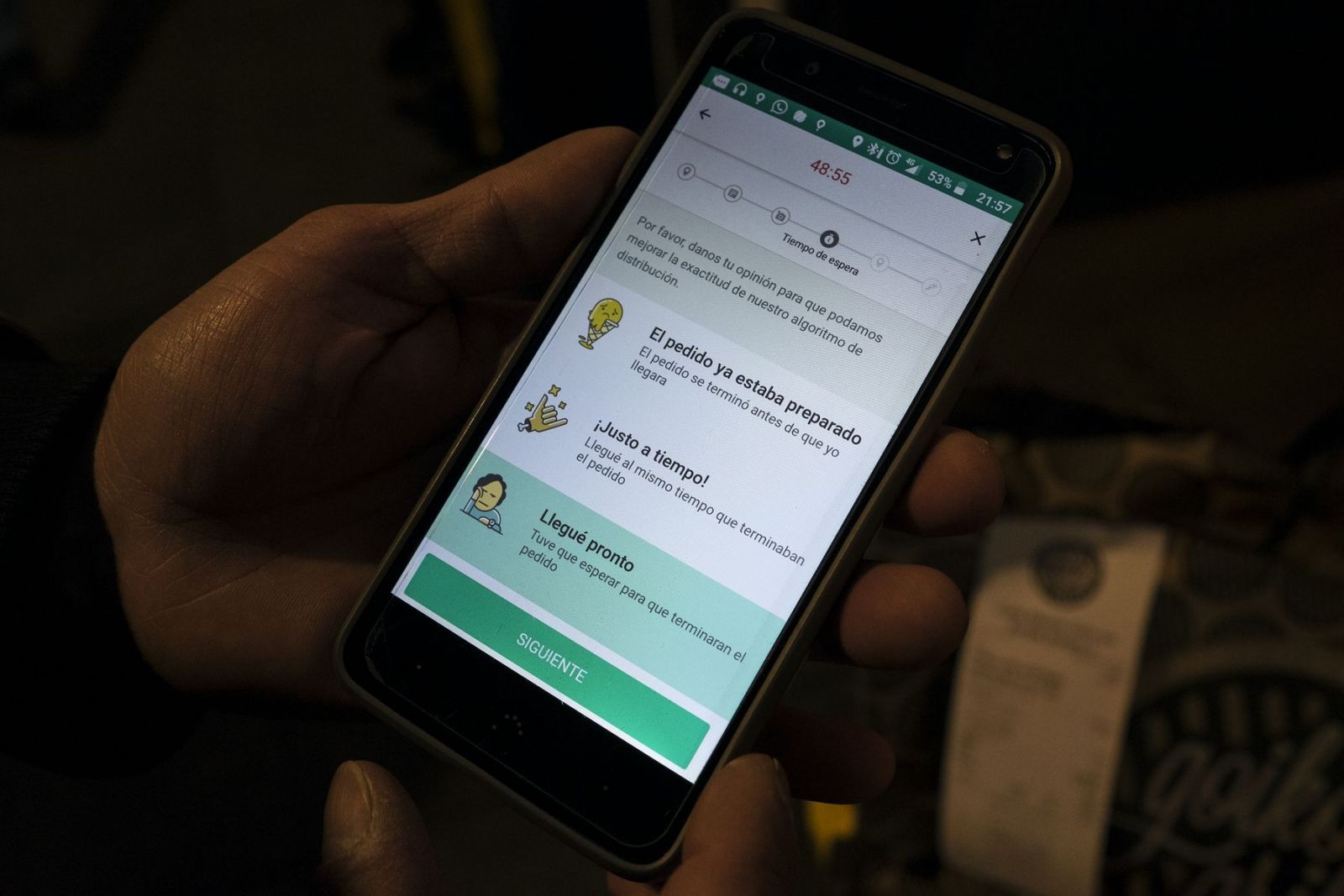
This is part of the gigantic change that is taking place in the international economy and is accelerating thanks to new technologies through platforms. The best way to make money for a business is to outsource costs and privatize profits. For many, that's the primary goal of capitalism. A typical example of this behaviour is that of the company that has the waste deposited in a landfill and that instead of paying taxes dumps the trash into the lake. The cost of the company is adapted to the ecosystem and to the population of the area: those who drink or bathe on the lake will suffer damage. Finally, some public bodies should take care of the lake's cleanliness.
Unfortunately, this is not the case yesterday morning. You can throw trash into the water, but you’ll always have to pay for your workshop’s costs, salaries, and raw materials. On the road to higher profits, all these unavoidable expenses are the main “hurdles” for companies. However, for companies following the Glovo line, there is hardly any real cost once the application is created. With self-employed workers, they avoid paying social security and insurance, not to mention the costs of motorcycles, bicycles and cars. Glovo also doesn't pay me the electricity I need to charge my cell phone; renting a simple premises in urban areas is enough for the company. Glovo doesn't exist in the real world in a nutshell. It is a kind of ethereal ghost that has no physical presence, that cannot be touched or contacted and that, in the meantime, is proud to absorb money from here and there through the streets.
In the past, distribution companies assumed the costs of staff and residence, which must be paid for by false self-employed persons or by the company itself. If my bike breaks, I'll have to pay for the repair. In the event of an accident at work, it must be paid by the public health service. Likewise, Glovo will not give me a free day if I am sick or have children. In general, Glovo has efficiently outsourced all the costs of the food transportation process from one place to another. Just pay for the app, computer servers and well-made shipments. Costs for workers or society; benefits will only be received by Glovo.
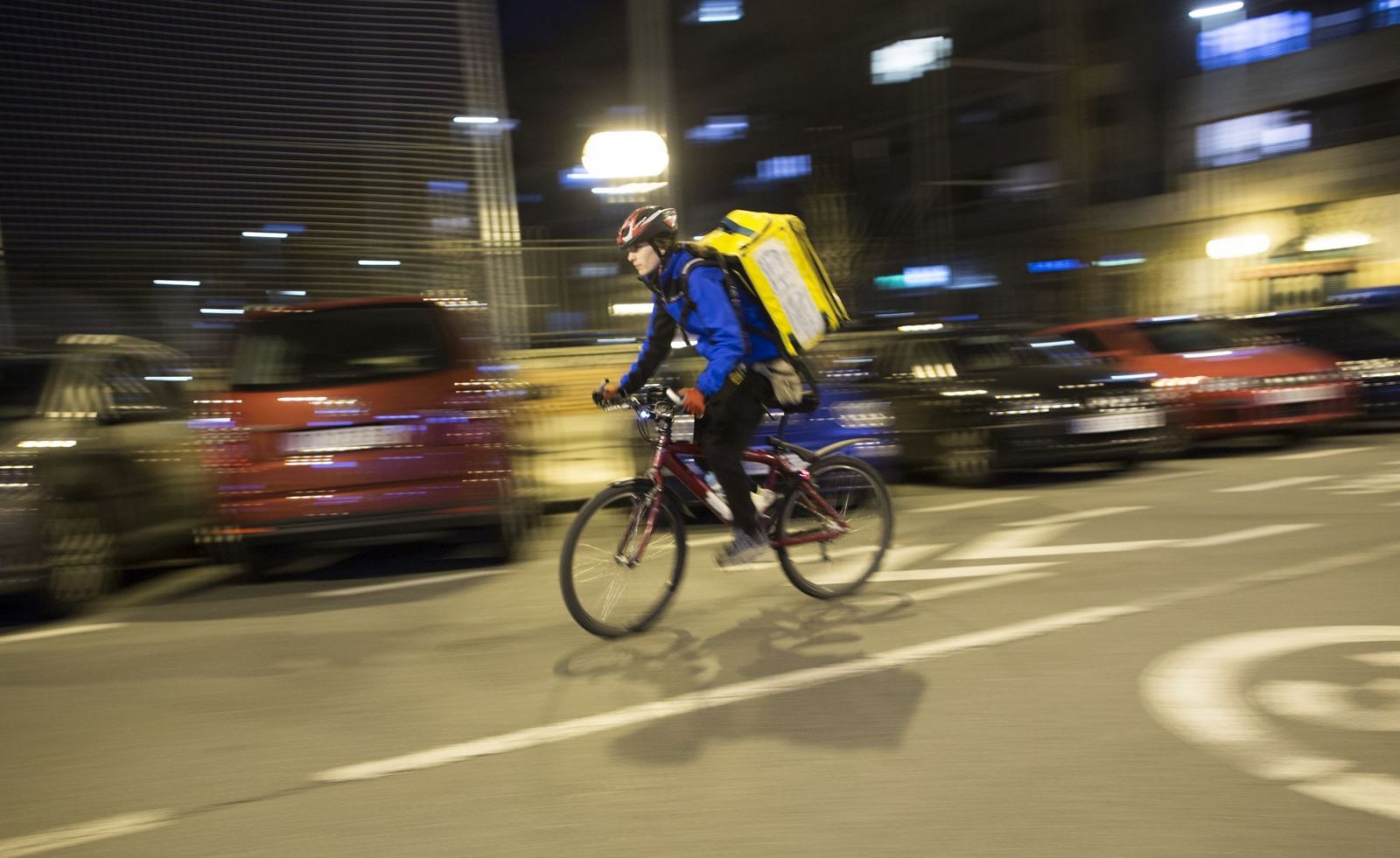
Pizza in half an hour, a matter of life and death
It's a Sunday night and I go through the streets at full speed, along the avenue that connects a shopping center with the city center. I have worked nine hours and I find it increasingly difficult to keep my attention. Yesterday I celebrated the birthday of my partner and another friend and I have to recover those “lost” hours in order to get a significant salary at the end of the month. It's 22:00 hours, and I've found that the figures I've considered as floaters are parchimeters. An hour before I finish, I have to feel dizzy and feel like throwing up on the handlebar. Don't think I have no experience on two wheels, I've made very long bike trips. I would say that I am young and that I am in very good shape. But a day of work like this spoils me if I feel like it or not: nine hours without the phone giving a breath, a constant zigzag in the traffic of the city, an indifferent number of passersby who don't look before crossing the bidegorris... This is an extremely serious stress that can destroy anyone.
I heard the noise of metal against the road passing through a roundabout. I looked back and saw a Latin American man on the ground, in a zebra crossing that receives little light. It is under a blue motorcycle, the motor has on its back a box named Domino’s Pizza. I quickly turned and got off the bike. In the hope that my face bicycle lamp will announce the cars that come, I leaned next to him and examined him. He hasn't hooked his leg under the motor, but just in case I asked him. He's in shock, he can't answer. Looking in the eyes, I replied out loud and clear: “Are you stuck in the engine?” He says no with his head. “So, little by little, I can take the engine off you. Do you want the engine to move?” Yes with your head. Half a dozen people have already appeared, but they also seem to be in deep shock. We asked for help to a guy looking sturdy and we removed the engine from him. Once I've finished, I've realized that the rest of the pedestrians have gone to warn the speecher and it's too late to warn him that there may be some kind of internal injury. People should know.

Someone has already called on the police and I have found that my attempts to put people out of man a little are useless and then I have decided to leave. My client lives at 100 meters and I'm losing money, I have to keep working. I bike up and I got on my way. Minutes later, after putting my best face to the clientele and thanking him, I went through the scene of the accident. Two police cars and an ambulance hinder the whole street, while the motorist is driven by a camaster on a stretcher. As I moved towards the next petition, it seemed to me to see the two days that the man’s absence will last. In the best case you will have papers to work legally, otherwise you are screwed. Thanks to a public health service like the one we don't have in the United States, savings aren't at risk of being lost, but they won't be able to walk a long time on a motorcycle. The company Domino’s, despite paying only six euros per hour, has private insurance for distributors, unlike Glovo. A good contract should enable you to cope with the accident, as it guarantees the possibility of returning to work after a low season. In my work and in my country we have no news of such protective measures. For a worker who is not covered by workers' rights, this accident would take on a new dimension. For him, the small risks he is exposed to daily in his work can easily become serious problems beyond his control. As I walked away pedalling, thinking about the least protections that this man could have, he thinks: half bad... Even if it's hard, all of this has happened in exchange for a pizza.
Innovative outsourcing: what will leave us without work
Last season in Glovo, I spoke on more than one occasion of being American. Almost all of Glovo’s workers are immigrants and almost all of them have made a short stay in the United States or, at least, are very keen to go there. No wonder. If the propaganda of the American dream and the fantasies of getting rich quickly endow your cultural context, then you will not find it a very nice plan to break the leg in Euskal Herria in exchange for six euros per hour. The principles of American capitalism are competence and ambition, the need to identify with your superiors and show your courage in the struggle with your peers. Unfortunately, these are only ideas that are far from reality and can only be dismissed through personal experience. Seeing my peers dreaming of Uncle Sam over and over again, I feel the need to confront dreams of reality in search of the right words and metaphors to express the life of a common American in the clearest and most understandable way possible. As always, fourteen nuts at a distance.
If the propaganda of the American dream and the fantasies of getting rich quickly endow your cultural context, then you will not find it a very charming
plan
to break the leg in Euskal Herria for
six euros per hour
Yes, on average, an American worker charges more than here, but this simple fact hides a much harder reality. For example, I remember walking around with colleagues who recently graduated with me. They can be classified into two categories. The first, born in the middle class: having obtained some scholarships and invested a significant amount of small savings from the parents, they have finally had to borrow between 100,000 and 200,000 dollars to be able to pay tuition, books and rentals. As far as I know, all of them are working at the reception at the Starbucks, in 40- to 50-hour days, moving forward perfectly. In the second group there are those who have not known the debts, as their parents have paid the price of their studies in cash each year ($60,000), $15,000 of the rent and thousands of other daily expenses. These students, at least those I know, are currently working in the banking sector, in companies like Goldman Sachs.
Higher education in the United States is not a sure way to avoid this terrible future for young people. This is the new rule of the economy and it is nothing hopeful. GDP growth has been on the rise to exceed the numbers before the 2008 crisis. Compared to 2007, however, there were 5% fewer jobs in 2015. Since the 1980s, permanent and full-time jobs, backed by trade unions and legislation, ensuring health insurance and saving, raising the company and getting a decent retirement, have been in serious decline. Those that are being created to replace them are temporary, usually part-time, uninsured and with low wages. The pairs found in Glovo. Thus, taking the wage pyramid, while since 1979 the salaries of 1% at the top have increased by 240%, the purchasing power of the workers has remained static in the face of the increase in the cost of living. For 47% of Americans today, it would be impossible to get $400 in the event of an unexpected emergency. Even in decent jobs, the law doesn't set a certain number of hours of weekly rest, there's no paid vacation, let alone paternity leave, and the health service is science fiction. However, every employer earns on average between 400 and 500 times a worker's salary. In the French state they earn 91 times more and in Spanish they earn 125 times more. I have heard some very serious Basques protesting that the Mondragon Corporation has raised this ratio from three to nine. On those occasions it is difficult to hold a smile.

I see from afar the economics of the EE.UU. It's dividing more and more deeply: some are giving everything for a few to earn everything. Before our eyes, we destroy jobs worthy of pay and rights and replace these with hook type jobs, by the hand of Uber, Amazon Flex, etc. Despite the fact that some people are left out of touch with this dynamic, the current situation is not surprising, after decades of reforms that have led to the weakness of the workers' power. For some, economics is a game to maximize efficiency and production, and so successful companies play for the benefit of society by creating a middle class of money. Others, on the other hand, consider the economy as a life-and-death struggle between the owners and working families. And in that dispute, any improvement will come by joining forces and fostering popular power.
Without forgetting the imbalance and exploitation of the colonial economy of the twentieth century, we can say that we are facing a new and dangerous phenomenon. In this world of companies through platforms, we can only find two types of work. In the case of Glovo, on the one hand, the people who transport food in exchange for a very modest reward – if they were under contract their salary would certainly be illegal – and on the other hand, the owners who create the application and then manage the company. Glovo has created a duopoly, a company that has only two types of workers. Some have facilities for buying real wages, social security and actions that can give hundreds, thousands or millions of euros. The others, nothing.
The image of manufacturing industries prior to the 21st century has been outdated. Today’s tech giants – Facebook, Google, Twitter, Uber, etc. – hardly need personnel and physical locations – in addition to the main residences they usually have in EE.UU – and barely pay taxes. With these practices, the benefits are huge compared to the costs. Because it is not easy to determine what the costs of these companies are.

As for outsourcing, Glovo’s main “innovation” is that every worker becomes self-employed. As of 2013, the quotas of self-employed in the Spanish State have been established according to a progressive system. At first you have to pay EUR 60 a month and a year, if your business is still open, the fee is EUR 100. Finally, from the third year the price is 364.22 euros per month. In Glovo's job interview, I asked about this quota. The boss told me about the tone used in describing the time that virtually all workers leave their job a year after they start, because they can't pay as the fee goes up. In my case, the quota for newcomers had earned me a sixteenth part of the salary, if I paid the full fee, I would have received half of the salary.
In other words, Glovo has adopted a public policy of support for small entrepreneurs and uses it not to pay social security costs to workers. As all workers leave work in one year, the Spanish State is providing Glovo with immense support, but not directly. Without this subsidy, Glovo's working structure would be dismantled, which is saving €304.22 per worker per month. For example, with 200 riders installed in the city of Valencia the price is 60,844 euros less per month. Millions across the state?
If we look carefully at all of these companies, we can find signs of a strategy. They all share the same characteristic: the services they offer are very cheap or free of charge. We could believe that they are really bad entrepreneurs, but in reality, by stepping up the costs of their business and setting almost ridiculous prices, they are monopolising all sectors of the economy. Later, using monopoly and externalisation, prices rise to the detriment of consumers – the workers, of course, will not charge any more. As these predators spread to other areas, industries with better wages and better labor rights are absorbing and leaving a sterile landscape filled with miserable jobs. Workers, as desperate as they are individualized, cannot rise up in the face of this trend, while people do not doubt these changes because any technological innovation is inevitable.
The effects in the United States are already quite widespread. In education, temporary jobs are the predominant ones for teachers and all the material they are going to use they have to buy themselves. People engaged in loading and unloading have to work faster and faster for equal pay. They dismiss the cleaners and then do the same work, but with a more regrettable contract. Lorries must be bought by drivers and the debt must be paid with a working day of more than eight hours. Finally, the greatest novelty of technological giants has been to extend despair and precariousness among the workers. It is a systematic action to implement its strategy, which seeks to reduce solidarity and the hope of developing power in the working class. Any job that does not require a more specific profile can be a potential victim of this system. This tactic has been extended to various areas, although there are no indications of new technologies in them. They only need a high unemployment rate so that citizens are prepared to accept the job insecurity imposed on them under any condition.
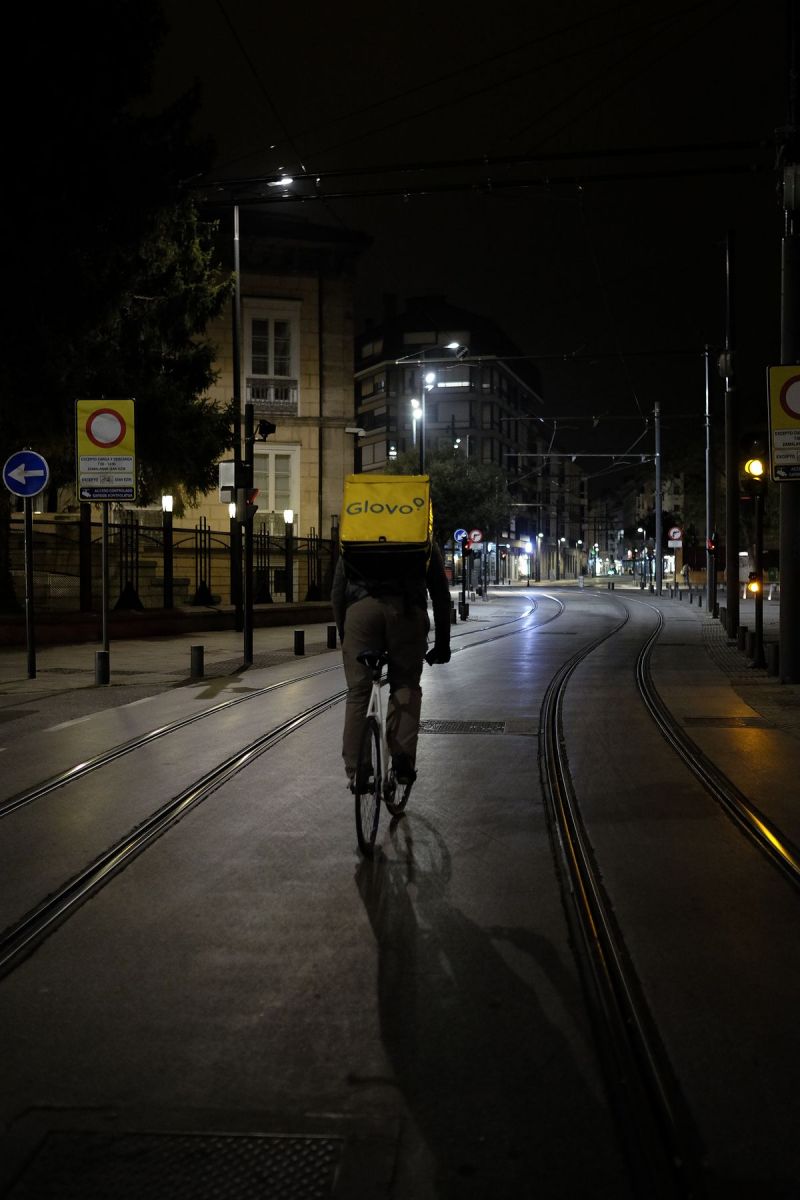
The future: you say it
I left the United States a long time ago and at the moment I have no intention of coming back. To say this, it confuses the people here. Is it because of the closer relationship between the Basques and their families and the people? Many still don't understand why I came here. The truth is, I once came back. I soon realized the “enchanting” perspectives that I had at my disposal in the United States: choosing a hateful job, which would not give me enough to pay rent and evil. I remember meeting with former colleagues. The restaurants were collecting the minimum wage and the minimum wage required of them. Worse still, without any plans to get out of this situation. I remember I had to take the car to go everywhere, even to the bars. I remember having to pay 100 dollars to make a quiet plan with my friends. I decided to come back.
In Euskal Herria, the collective resistance is still about nacer.En Vitoria-Gasteiz,
in my house, the anger has taken the form of graffiti on the walls of the Glovo headquarters
I did not come here because the society here is extremely comfortable for me or because of the charm of Euskal Herria. I've decided to stay here because I don't have to think about what's worse: die after a shot or survive the number of hospital bills. I can pay the rent without having to work from 06:00 to 20:00. When I get home from work, I can calm down and talk to my friends without always having my head at the mercy of my phone or work. These things are nothing Baladis, because thanks to them I can have the life that I want to live. From a distance I see how the decisions of my parents’ generation have wreaked havoc in the American economy, politics and society. I sincerely hope that these mistakes will not be repeated here.
There are reasons for hope. Signs of resistance against Glovo can already be seen. The trade unions and state lawyers are working hard on the legal front and are obtaining a number of judgments in favour of workers. As I write this article, Glovo is appealing to argue that riders are genuine self-employed and that their activity is entirely legal. Through social networks, the first unions and cooperatives of the economy are being created, with the aim of organizing strikes and joining forces. In Barcelona and Madrid alternative startups have appeared with the objective of making direct competition to Glovo and similar ones. In Euskal Herria, collective resistance is still about to be born. In Vitoria, in my house, the anger has taken the form of graffiti on the walls of the Glovo headquarters. This has made it clear that there are people who are aware of the risk. As a principle it is not bad, but I think we can do better.
LANBIDE has launched an anti-fraud campaign in Income Guarantee Income and has created an anonymous whistleblower. Responding to the criticisms received, he said that this mailbox was merely an instrument for ordering complaints and notifications. It does not promote class... [+]









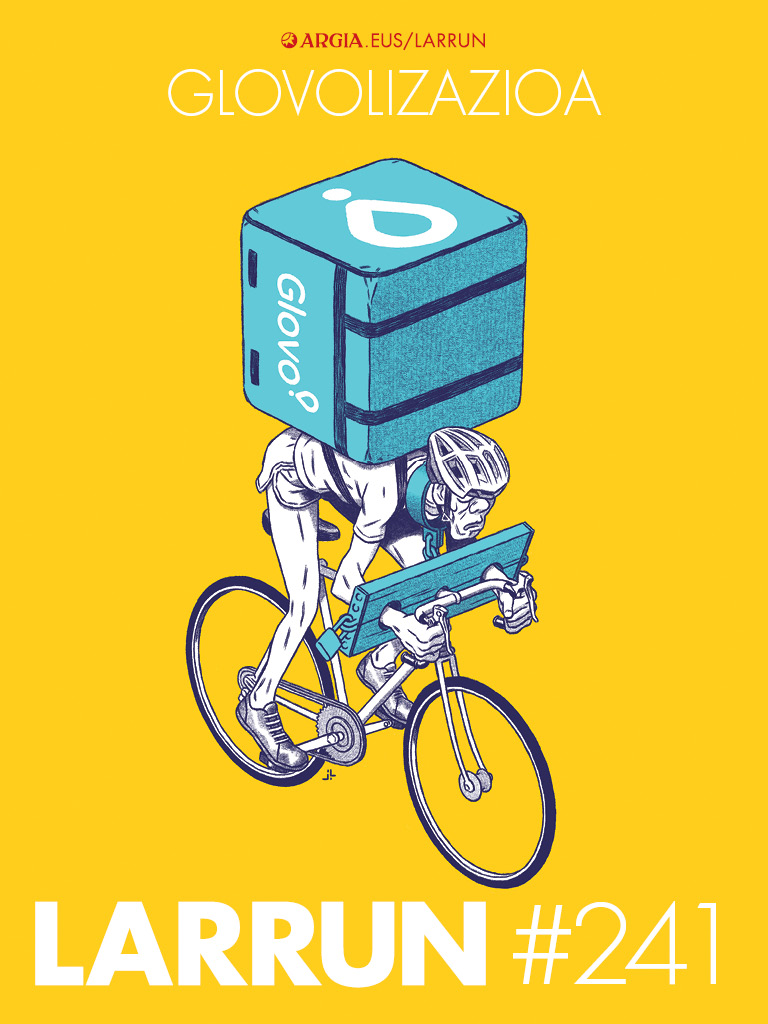


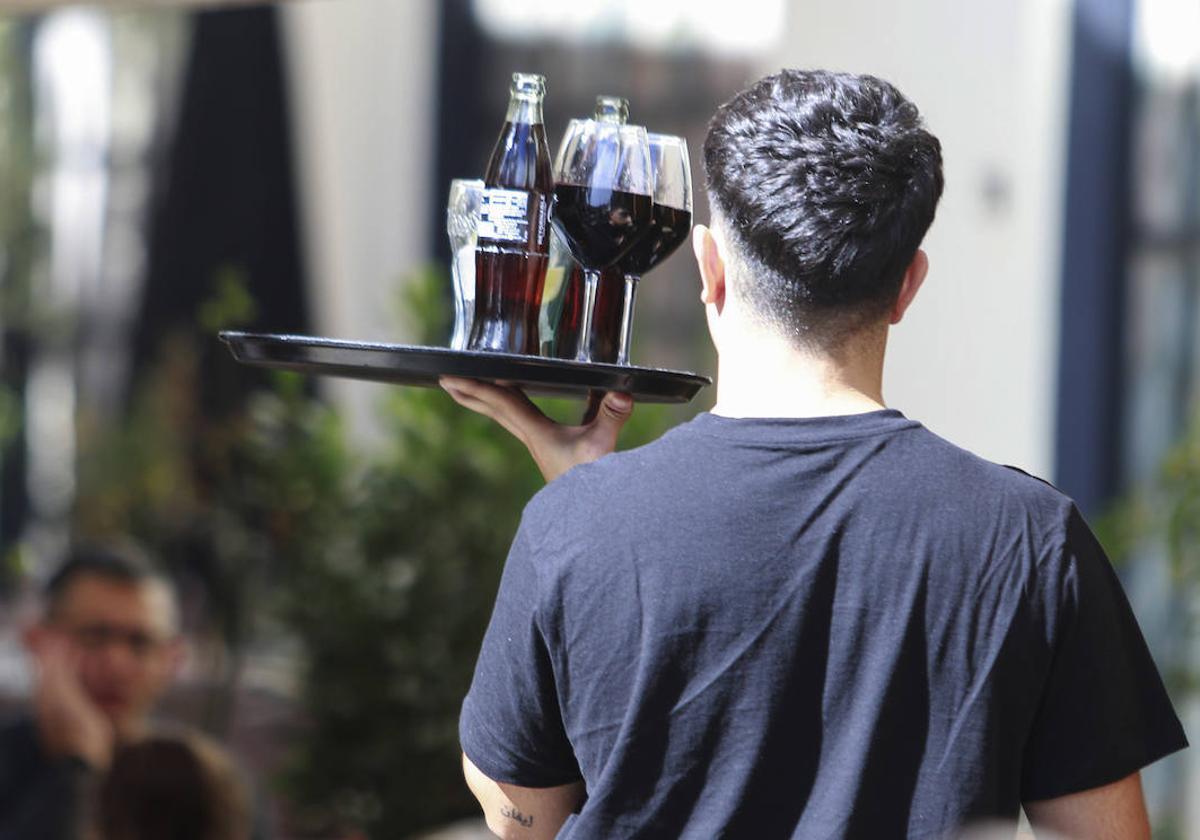

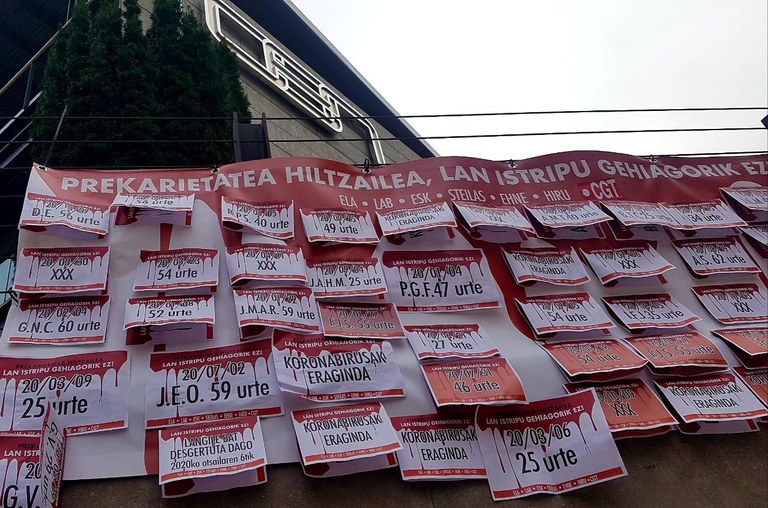
-(1).jpg)




